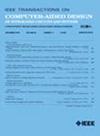基于稀疏优化电路的鲁棒量子特征选择
IF 2.7
3区 计算机科学
Q2 COMPUTER SCIENCE, HARDWARE & ARCHITECTURE
IEEE Transactions on Computer-Aided Design of Integrated Circuits and Systems
Pub Date : 2025-01-06
DOI:10.1109/TCAD.2025.3526060
引用次数: 0
摘要
长期以来,高维数据一直是一个非常具有挑战性的问题。现有的量子降维技术主要集中在量子主成分分析上。然而,关于量子特征选择(QFS)算法的研究很少,而且这些算法通常不具有鲁棒性。此外,专门用于特征选择的量子电路有限,它们仍然无法处理基于稀疏学习的目标函数。为了解决这些问题,本文通过设计一种新颖的稀疏优化电路,提出了一种鲁棒的QFS算法。具体来说,我们首先应用稀疏正则化和最小二乘损失来构造所提出的目标函数。然后,制备了六种类型的量子寄存器及其初始态。利用量子相位估计和控制旋转等量子技术构建稀疏优化电路,获得特征选择变量的最终量子态。最后,通过一系列实验验证了特征选择的准确性和算法的鲁棒性。本文章由计算机程序翻译,如有差异,请以英文原文为准。
Robust Quantum Feature Selection With Sparse Optimization Circuit
High-dimensional data has long been a notoriously challenging issue. Existing quantum dimension reduction technology primarily focuses on quantum principal component analysis. However, there are only a few studies on quantum feature selection (QFS) algorithms, and these algorithms are often not robust. Additionally, there are limited quantum circuits specifically designed for feature selection, and they still cannot address the objective function based on sparse learning. To address these issues, this article proposes a robust QFS algorithm by designing a novel sparse optimization circuit. Specifically, we first apply sparse regularization and least squares loss to construct the proposed objective function. Then, six types of quantum registers and their initial states are prepared. Furthermore, quantum techniques such as quantum phase estimation and controlled rotation are employed to construct a sparse optimization circuit, which is used to obtain the final quantum state of the feature selection variable. Finally, a series of experiments are conducted to verify the accuracy of the feature selection and the robustness of the proposed algorithm.
求助全文
通过发布文献求助,成功后即可免费获取论文全文。
去求助
来源期刊
CiteScore
5.60
自引率
13.80%
发文量
500
审稿时长
7 months
期刊介绍:
The purpose of this Transactions is to publish papers of interest to individuals in the area of computer-aided design of integrated circuits and systems composed of analog, digital, mixed-signal, optical, or microwave components. The aids include methods, models, algorithms, and man-machine interfaces for system-level, physical and logical design including: planning, synthesis, partitioning, modeling, simulation, layout, verification, testing, hardware-software co-design and documentation of integrated circuit and system designs of all complexities. Design tools and techniques for evaluating and designing integrated circuits and systems for metrics such as performance, power, reliability, testability, and security are a focus.

 求助内容:
求助内容: 应助结果提醒方式:
应助结果提醒方式:


